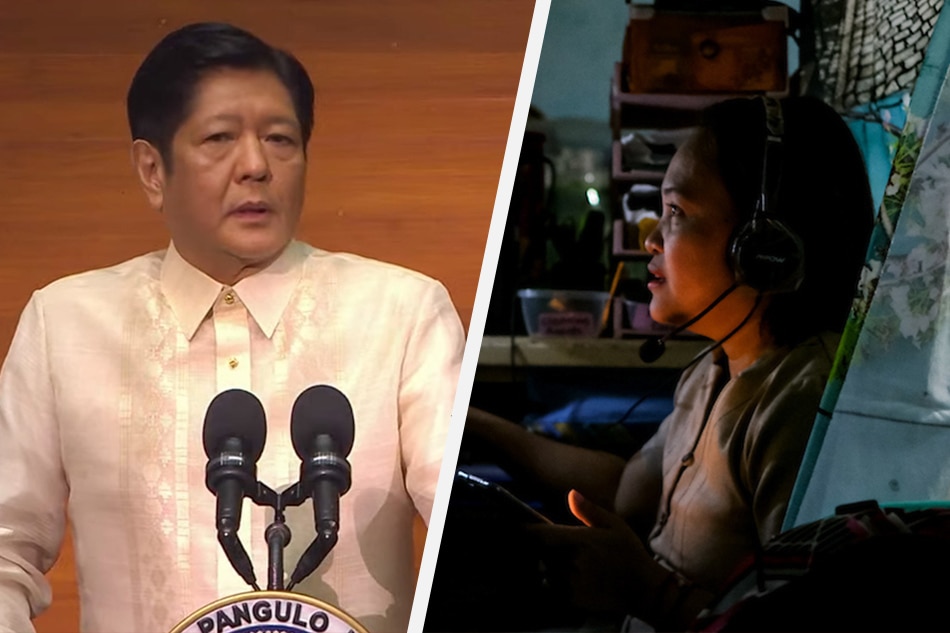Marcos eyes universal connectivity, further digitalization of govt processes | ABS-CBN

Welcome, Kapamilya! We use cookies to improve your browsing experience. Continuing to use this site means you agree to our use of cookies. Tell me more!
Marcos eyes universal connectivity, further digitalization of govt processes
Marcos eyes universal connectivity, further digitalization of govt processes
Art Fuentes,
ABS-CBN News
Published Jul 25, 2022 06:35 PM PHT
|
Updated Jul 25, 2022 09:58 PM PHT
MANILA (UPDATE) - President Ferdinand Marcos Jr said he wants universal connectivity and a further digitalization of government processes to advance economic growth.
MANILA (UPDATE) - President Ferdinand Marcos Jr said he wants universal connectivity and a further digitalization of government processes to advance economic growth.
During his first State of the Nation Address, Marcos said he has ordered the Department of Information and Communications Technology to “deploy digital connectivity across our various islands.”
During his first State of the Nation Address, Marcos said he has ordered the Department of Information and Communications Technology to “deploy digital connectivity across our various islands.”
Marcos also said he has tasked the DICT to transform the government into “an agile bureaucracy that is responsive to the needs of the public” using digital technologies.
Marcos also said he has tasked the DICT to transform the government into “an agile bureaucracy that is responsive to the needs of the public” using digital technologies.
“The voluminous records stored in the government warehouses and archives have to be digitized. Those that are already stored in various inventories of data should be harmonized and shared across departments and agencies,” Marcos said.
“The voluminous records stored in the government warehouses and archives have to be digitized. Those that are already stored in various inventories of data should be harmonized and shared across departments and agencies,” Marcos said.
ADVERTISEMENT
The chief executive asked lawmakers to pass the E-Governance Act
Which he said will promote the use of ICT to provide opportunities for citizens.
The chief executive asked lawmakers to pass the E-Governance Act
Which he said will promote the use of ICT to provide opportunities for citizens.
Areas underserved by telcos can be connected through the National Broadband Plan, the common tower program, and the “Broadband ng Masa” program.
Areas underserved by telcos can be connected through the National Broadband Plan, the common tower program, and the “Broadband ng Masa” program.
He also underscored the importance of the National ID program in the digitalization push.
He also underscored the importance of the National ID program in the digitalization push.
“For citizens to be able to seamlessly transact with government, their identity must be verifiable,” he said.
“For citizens to be able to seamlessly transact with government, their identity must be verifiable,” he said.
The government is targeting to to issue 30-million physical IDs and 20-million digital IDs by the end of the year, Marcos said.
The government is targeting to to issue 30-million physical IDs and 20-million digital IDs by the end of the year, Marcos said.
By the middle of 2023, about 92-million IDs will be issued he said.
By the middle of 2023, about 92-million IDs will be issued he said.
Marcos said connectivity can be boosted by the entry of new players, with the removal of restrictions on foreign investment in the telco sector.
Marcos said connectivity can be boosted by the entry of new players, with the removal of restrictions on foreign investment in the telco sector.
The Philippines has steadily improved in global rankings for both mobile and fixed line internet speeds. However, the country’s average speeds are still below the international median speed.
The Philippines has steadily improved in global rankings for both mobile and fixed line internet speeds. However, the country’s average speeds are still below the international median speed.
Internet industry speed tracker Ookla however noted that the entry of third telco DITO has led to significant improvements in internet speed as it pushed PLDT and Globe to also improve their services.
Internet industry speed tracker Ookla however noted that the entry of third telco DITO has led to significant improvements in internet speed as it pushed PLDT and Globe to also improve their services.
ADVERTISEMENT
ADVERTISEMENT


